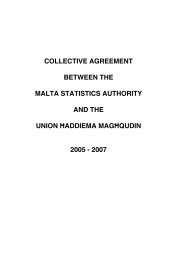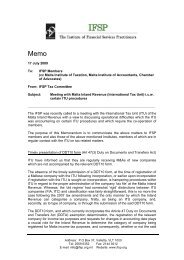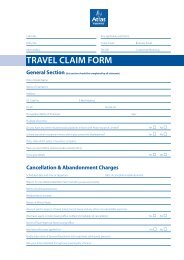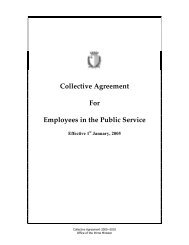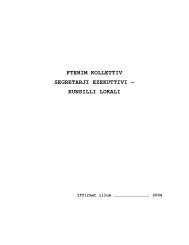Collective Agreement 2002-2004
Collective Agreement 2002-2004
Collective Agreement 2002-2004
You also want an ePaper? Increase the reach of your titles
YUMPU automatically turns print PDFs into web optimized ePapers that Google loves.
<strong>Collective</strong> <strong>Agreement</strong><br />
For<br />
Employees in the Public Service<br />
In Respect of the Years<br />
<strong>2002</strong> ~ <strong>2004</strong><br />
<strong>Collective</strong> <strong>Agreement</strong> <strong>2002</strong> ~ <strong>2004</strong><br />
Office of the Prime Minister
CONTENTS OF AGREEMENT<br />
SECTION 1 - Preamble<br />
2 - Interpretation and Definitions<br />
2.1. Definitions<br />
2.2. Gender<br />
3 - Term of <strong>Agreement</strong><br />
4 - Future Legislation<br />
5 - Management of Business<br />
6 - Classification and Grading Structures<br />
7 - New Initiatives<br />
8 - Improved Conditions of Service<br />
8.1. Vacation Leave on Half Day/Hourly Basis<br />
8.2. Deputising Allowance<br />
8.3. Implementation of Initiatives in Priority Areas<br />
8.4. One Year Alternative Job Special Leave<br />
8.5. Payment by Direct Credit<br />
8.6. Early Retirement Schemes<br />
8.7. Conditions of Service of Casuals and Part-timers<br />
9 - Issues Outstanding from Previous <strong>Collective</strong> <strong>Agreement</strong><br />
9.1. Review of Allowances<br />
9.2. Coverage of Public Officers Against Certain Risks<br />
10 - Salaries<br />
APPENDIX<br />
I<br />
Revised Rates of Certain Allowances<br />
II Schedule of Salary Scales applying in <strong>2002</strong>, 2003, <strong>2004</strong><br />
III<br />
Salary maxima of scales payable in 2003, <strong>2004</strong>, to<br />
serving Public Officers<br />
<strong>Collective</strong> <strong>Agreement</strong> <strong>2002</strong> ~ <strong>2004</strong>/MPO 05.12.02
1. PREAMBLE<br />
1.1. Whereas it is the intention and purpose of the parties to this <strong>Agreement</strong>:<br />
(a) to maintain the harmonious industrial relations existing between the<br />
Government of Malta, the employees in the Public Service and their<br />
respective Unions;<br />
(b) to improve the productivity of public officers as well as the range and<br />
quality of the public services to the Government and people of Malta;<br />
and,<br />
(c) to consolidate the improved conditions of employment and the<br />
well-being of the employees in the Public Service,<br />
accordingly, the parties to this <strong>Agreement</strong> have agreed to the following<br />
clauses forming part of this <strong>Agreement</strong>.<br />
2 INTERPRETATION AND DEFINITIONS<br />
2.1. Definitions<br />
2.1.1. For the purpose of this <strong>Agreement</strong>:<br />
(1) "<strong>Agreement</strong>" means the <strong>Collective</strong> <strong>Agreement</strong> for employees in the<br />
Public Service in respect of years <strong>2002</strong> – <strong>2004</strong> entered into between<br />
the Government of Malta and the Unions representing employees in<br />
the Public Service;<br />
(2) "Employer" means the Government of Malta;<br />
(3) The term "Employee" or "Employees", wherever used in this<br />
<strong>Collective</strong> <strong>Agreement</strong>, mean all public officers in the Public Service<br />
covered by this <strong>Collective</strong> <strong>Agreement</strong>; and,<br />
(4) "Unions" means the:<br />
<strong>Collective</strong> <strong>Agreement</strong> <strong>2002</strong> ~ <strong>2004</strong>/MPO 05.12.02 Page 1
General Workers Union<br />
Union Óaddiema Maæqudin<br />
Malta Union of Midwives and Nurses<br />
Malta Union of Professional Psychologists<br />
Malta Union of Teachers<br />
Medical Association of Malta<br />
2.2. GENDER<br />
Unless any provision of this <strong>Agreement</strong> otherwise specifies, words referring<br />
to the masculine gender shall include females and vice versa.<br />
3 TERM OF AGREEMENT<br />
3.1. This <strong>Agreement</strong> shall have effect from 1 st January, <strong>2002</strong>, and shall remain<br />
in effect until 31 st December, <strong>2004</strong>.<br />
3.2. Negotiations in respect of the next <strong>Collective</strong> <strong>Agreement</strong>, effective 1 st<br />
January, 2005, will commence in June <strong>2004</strong>. During negotiations and until<br />
a new <strong>Agreement</strong> is signed, the conditions laid out in this <strong>Agreement</strong> shall<br />
remain in force.<br />
4 FUTURE LEGISLATION<br />
4.1. The Employer and the Unions agree that any benefits derived from this<br />
<strong>Agreement</strong> will not be additional to any similar benefits stipulated by Law,<br />
or by the enactment of legislation during the period of validity of this<br />
<strong>Agreement</strong> provided that the employee shall receive the benefit which is<br />
most advantageous to the employee.<br />
5 MANAGEMENT OF BUSINESS<br />
5.1. The management of the business in general and the operations of the<br />
Employer and the authority to execute all the various duties, functions and<br />
<strong>Collective</strong> <strong>Agreement</strong> <strong>2002</strong> ~ <strong>2004</strong>/MPO 05.12.02 Page 2
esponsibilities incidental thereto, including the management of its relations<br />
with employees, is vested in the Employer. The exercise of such authority<br />
shall not conflict with this <strong>Agreement</strong> since matters concerning changes in<br />
the conditions of service of employees shall first be discussed and agreed<br />
with the Unions.<br />
6 CLASSIFICATION AND GRADING STRUCTURES<br />
6.1. The Employer and the Unions agree that the established benchmarks shall<br />
not be disturbed. The salary structures in the current Public Service<br />
Classification <strong>Agreement</strong>s shall continue to respect these benchmarks.<br />
6.2. The employer and the Unions also agree to discuss issues of a sectoral<br />
nature which, whilst safeguarding the principle set in the next preceding<br />
paragraph, could lead to improved work practices and enhanced<br />
opportunities for career progression.<br />
6.3. Discussions between Government and the Unions will commence within<br />
one month from receipt of proposals by Management and Personnel<br />
Office. Every effort will be made to conclude negotiations on sectoral<br />
issues within six months from 1 st January, 2003, or from date of receipt of<br />
proposals whichever is the later.<br />
7 NEW INITIATIVES<br />
7.1. In the setting up of new initiatives, directly or indirectly involving<br />
employees, the Employer undertakes to provide all the necessary<br />
safeguards and the retention of all present rights and privileges to the<br />
employees.<br />
<strong>Collective</strong> <strong>Agreement</strong> <strong>2002</strong> ~ <strong>2004</strong>/MPO 05.12.02 Page 3
7.2. The Employer and the Unions recognise the continuing and increasing<br />
need to lend support to retraining and the multi-skilling initiative especially<br />
in the context of Private Public Partnerships. Parties agree to consult with<br />
a view to putting in practice a Private Public Partnership pilot project by the<br />
end of <strong>2002</strong>.<br />
7.3. Unions also agree to fully participate with the Employer in the setting up of<br />
mechanisms to enhance as far as is reasonably possible, flexibility in the<br />
use of human resources and in searching for new ways of ensuring the<br />
effective and efficient delivery of service.<br />
8 IMPROVED CONDITIONS OF SERVICE<br />
8.1. VACATION LEAVE ON HALF-DAY/HOURLY BASIS<br />
8.1.1. Employees working on a normal 40-hour, five-day week time-table will,<br />
henceforth, be entitled to utilise four (4) days from their vacation leave<br />
entitlement on a half-day basis during the winter time-table. With the<br />
exception of this increase from two days (four half days) to four days (eight<br />
half days) entitlement of utilisation, all the other provisions of OPM Circular<br />
No. 57/86 remain unchanged.<br />
8.1.2. Employees working on a shift roster, and employees working on a six-day<br />
week, may utilise part of their vacation leave entitlement by the hour<br />
subject to the following conditions:<br />
(a) absence should be of a minimum of four (4) hours at a time. In the<br />
case of employees on a six-day week, the minimum of the absence<br />
may be of three (3) hours;<br />
(b) absence should not be allowed if the employees have not utilised any<br />
time-off to which they may be entitled;<br />
<strong>Collective</strong> <strong>Agreement</strong> <strong>2002</strong> ~ <strong>2004</strong>/MPO 05.12.02 Page 4
(c) apart from being recorded in the vacation leave card, attendance should<br />
also be recorded in punch clocks, hand verifiers, attendance sheets;<br />
(d) vacation leave by the hour should not exceed thirty-two (32) hours, this<br />
means eight (8) absences of four (4) hours, or lesser absences of more<br />
hours. Employees on a six-day week who opt for absences of three (3)<br />
hours will still be bound by a maximum of eight (8) absences. The<br />
multiplier of the absences may not be of less than four (4) hours. In the<br />
case of six-day week workers the multiplier of the absences must be of<br />
not less than three (3) hours.<br />
(e) vacation leave by the hour will only be allowed if no overtime is incurred<br />
to substitute the employees.<br />
8.2. DEPUTISING ALLOWANCE<br />
8.2.1. Vacancies in Categories ‘A’ and ‘B’ will be immediately filled but where this<br />
is not found possible, and where an officer is detailed to deputise for his<br />
senior in the vacant position for a period over three months, the head of the<br />
department shall authorise the payment of a Deputising Allowance.<br />
8.2.2. The allowance payable will be the difference between the officer's present<br />
salary and the minimum of the higher grade, to be not less than one<br />
increment in the higher scale. The deputising allowance will be augmented<br />
by one increment in the higher scale for every period of twelve months on<br />
deputising duties, provided the maximum of that higher scale is not<br />
exceeded.<br />
<strong>Collective</strong> <strong>Agreement</strong> <strong>2002</strong> ~ <strong>2004</strong>/MPO 05.12.02 Page 5
8.2.3. The payment of the allowance will commence when an officer has been<br />
deputising for his senior for three months but will then cover the whole of<br />
the acting period.<br />
8.2.4. These arrangements, which will come into effect on 1 st January, 2003, do<br />
not replace, but complement, the existing deputising provisions for heads<br />
of department and other deputising allowances provided for in<br />
Classification and Grading <strong>Agreement</strong>s.<br />
8.3. IMPLEMENTATION OF INITIATIVES IN PRIORITY AREAS<br />
8.3.1. The Management and Personnel Office will take the initiatives necessary<br />
to:-<br />
• promote and maintain a high degree of physical, mental, and<br />
social well being of public officers in all occupations;<br />
• encourage further the participation of female employees, in<br />
particular in the professional, vocational and managerial grades;<br />
• enhance as far as possible the status of disabled employees and<br />
their opportunities for advancement. Government departments<br />
will endeavour to ensure that all premises are accessible to<br />
disabled employees;<br />
• encourage a non-smoking environment in Ministries and<br />
Departments.<br />
8.3.2. The Management and Personnel Office will give its attention and<br />
commitment to these and other initiatives ensuring the continued role of<br />
Government as the model employer.<br />
8.4. ONE YEAR ALTERNATIVE JOB SPECIAL LEAVE<br />
<strong>Collective</strong> <strong>Agreement</strong> <strong>2002</strong> ~ <strong>2004</strong>/MPO 05.12.02 Page 6
8.4.1. The Employer agrees in principle to the grant of a minimum of three<br />
months and a maximum of three year's special leave on no pay renewable<br />
yearly to employees in salary scales 14 to 20 wishing to try an alternative<br />
job. Positive consideration to these requests will be subject to the particular<br />
exigencies of the Department/Ministry concerned. No replacement of<br />
employees availing themselves of this facility will be allowed.<br />
8.4.2. Approval will be given by the Management and Personnel Office on the<br />
recommendation of the Head of Department. The employee’s request will<br />
not normally be withheld unless the employee’s absence will seriously<br />
disrupt the efficiency of the Department.<br />
8.5. PAYMENT BY DIRECT CREDIT<br />
8.5.1. By not later than 1 st January, <strong>2004</strong>, the current monthly payment of<br />
salaries will cease and be replaced by thirteen four-weekly payments.<br />
Salaries and payments normally made with the payment of salaries will be<br />
adjusted accordingly.<br />
8.5.2. Concurrently with these arrangements the payment of salaries and other<br />
regular payments normally made with salaries will be made by directcredit<br />
to a bank of the employee’s choice.<br />
8.6. EARLY RETIREMENT SCHEMES<br />
8.6.1. The Employer and the Unions agree to explore the possibility of<br />
introducing early retirement schemes enabling employees to leave<br />
Government Service in cases of underutlisation or exceptionally<br />
strenuous/stressful duties.<br />
8.6.2. Discussions between the Government and the Unions will start within one<br />
month from receipt of proposals from the Unions and concluded within six<br />
months provided this is not earlier than 30 th June, 2003.<br />
<strong>Collective</strong> <strong>Agreement</strong> <strong>2002</strong> ~ <strong>2004</strong>/MPO 05.12.02 Page 7
8.7. CONDITIONS OF SERVICE OF CASUALS AND PART-TIMERS<br />
8.7.1. Parties to this document agree that the issue of conditions of service of<br />
Casuals and Part-timers should be evaluated and more meaningful<br />
nomenclatures should be adopted in the context of public service<br />
structures and practices.<br />
8.7.2. In this connection, the Employer undertakes to consider further the<br />
existing conditions of Casuals and Part-timers, also being guided by the<br />
Public Service Commission and the Constitutional regulations.<br />
8.7.3. The Employer, recognising the fact that technicalities may delay a long<br />
term definite solution, agrees in the absence of a solution by the end of<br />
the current year, to grant with effect from 1 st January, <strong>2002</strong>, the principle<br />
of increments for years of service to casuals and part-timers who are<br />
engaged on the minimum of a salary scale. The first increment above the<br />
minimum of the respective salary scale will not be paid earlier than 1 st<br />
January, 2003. Casuals and part-timers in the Public Service will be<br />
entitled to pro-rata leave and maternity leave with effect from 1 st January,<br />
2003.<br />
8.7.4. The parameters for the granting of pro-rata maternity Leave to parttimers/casuals<br />
not working to a full time-table, will be announced through<br />
a Management and Personnel Office Circular as early as possible after<br />
the signing of this <strong>Agreement</strong>.<br />
9 ISSUES OUTSTANDING FROM PREVIOUS COLLECTIVE AGREEMENT<br />
9.1. REVIEW OF ALLOWANCES<br />
9.1.1. Following a service-wide survey carried out by the Management and<br />
Personnel Office in consultation with the Ministry of Finance and interested<br />
Trade Unions, <strong>Agreement</strong> has been reached to revise a number of<br />
<strong>Collective</strong> <strong>Agreement</strong> <strong>2002</strong> ~ <strong>2004</strong>/MPO 05.12.02 Page 8
allowances of general applicability. As provided for in paragraph 2.5.1. (a)<br />
of the <strong>Collective</strong> <strong>Agreement</strong> for Public Service Employees covering the<br />
years 1996 to 1998 and 1999 to 2001, the effective date for the<br />
implementation of the revised allowances will be the 1 st January, 1999.<br />
The revised allowances are tabulated in Appendix I to this <strong>Agreement</strong><br />
which shows the new rates and applicability guidelines.<br />
9.1.2. In order to ensure the better management and control of the payment of<br />
the revised, and other allowances, the following principles and conditions<br />
will be observed:-<br />
a) the responsibility for the payment and grading of an allowance rests<br />
with the receiver’s Head of Department;<br />
b) Directors, Corporate Services, and / or Directors Finance and<br />
Administration, will submit to the Ministry of Finance, twice a year, a<br />
return showing details of employees in receipt of an allowance, the type<br />
and amount of the allowance, date of approval, and certification that<br />
conditions for payment are still applicable. A Finance Circular will<br />
articulate the specific requirements and dates of the return;<br />
c) allowances will stop immediately the conditions for the payment of the<br />
allowance are no longer applicable;<br />
d) where applicable, allowances will be graded according to the intensity<br />
of the element of disturbance, risk and skill.<br />
9.1.3. The Unions will furthermore cooperate with the Employer in actively and<br />
effectively promoting the concept of Health and Safety, removing risks<br />
and adverse working conditions thus obviating the need for the creation of<br />
new ‘ad hoc’ allowances.<br />
9.2. COVERAGE OF PUBLIC OFFICERS AGAINST CERTAIN RISKS<br />
9.2.1. Finance, in conjunction with MPO and the Unions, will explore possible<br />
arrangements and recommend to the Employer parameters of operation<br />
<strong>Collective</strong> <strong>Agreement</strong> <strong>2002</strong> ~ <strong>2004</strong>/MPO 05.12.02 Page 9
that would provide suitable coverage to employees exposed to certain<br />
occupational risks not inherent to the nature of employee's duties, e.g.<br />
handling of substantial amounts of cash and third-party liability in the case<br />
of traffic accidents.<br />
9.2.2. Discussions between the Government and the Unions will commence<br />
within one month from receipt of proposals from the Unions and<br />
concluded within six months provided this is not earlier than 30 th June,<br />
2003.<br />
<strong>Collective</strong> <strong>Agreement</strong> <strong>2002</strong> ~ <strong>2004</strong>/MPO 05.12.02 Page 10
10 SALARIES<br />
10.1. The parties agree that the maxima of the applicable salary scales payable<br />
to serving Public Officers during the years <strong>2002</strong>, 2003 and <strong>2004</strong> will be as<br />
shown in Appendix II to the <strong>Agreement</strong>, signifying a minimum increase of<br />
Lm2.50 per week in respect of 2003 and <strong>2004</strong> respectively, payable on a<br />
personal basis.<br />
10.2. The maxima of the salary scales payable to the new entrants in the Public<br />
Service in the years <strong>2002</strong>, 2003 and <strong>2004</strong> are those shown in Appendix III<br />
to this <strong>Agreement</strong>. The maxima for the years 2003 and <strong>2004</strong> partially<br />
address the restoration of relativities approved in 1991.<br />
10.3. The new maxima of the salary scales for the years 2003 and <strong>2004</strong> as<br />
shown in both Appendix II and Appendix III are inclusive of any cost of<br />
living adjustments which the Government may award in respect of these<br />
two years.<br />
10.4. A relative adjustment will be made to the salary scales should the cost of<br />
living allowance in the year <strong>2004</strong> exceed the agreed increase in pay.<br />
<strong>Collective</strong> <strong>Agreement</strong> <strong>2002</strong> ~ <strong>2004</strong>/MPO 05.12.02 Page 11
COLLECTIVE AGREEMENT FOR PUBLIC SERVICE EMPLOYEES<br />
YEARS <strong>2002</strong> - <strong>2004</strong><br />
For the Government<br />
For the Unions<br />
<strong>Collective</strong> <strong>Agreement</strong> <strong>2002</strong> ~ <strong>2004</strong>/MPO 05.12.02 Page 12
<strong>Collective</strong> <strong>Agreement</strong> <strong>2002</strong> ~ <strong>2004</strong>/MPO 05.12.02 Page 13<br />
Revised Rates of Certain Allowances<br />
Type of Allowance Beneficiaries Rate<br />
1. Clothing (Wear & Tear) Employees involved in outdoor work which entails Wear and tear allowance is not to be granted in<br />
wear and tear of clothing<br />
lieu of a uniform.<br />
2. Shift Allowance Employees who work on shift.<br />
(i) Mon to Sat (without night shift)<br />
(ii) Mon to Sat (with night shift)<br />
(iii) Mon to Sun (without night shift)<br />
(iv) Mon to Sun (with night shift)<br />
3. Handling of Waste at Sant’ Antnin Employees working at Sant’ Antnin waste<br />
processing plant<br />
4. Duties at Maghtab and Qortin<br />
Sites<br />
Employees who work at Maghtab and<br />
Qortin Sites<br />
Maximum rate of allowance is to be Lm100 p.a.<br />
Rate of allowance is to be graded according to the<br />
degree of wear and tear in each case and is to be<br />
decided by Head of Department.<br />
Grading is to be divided into four (4) categories:<br />
100%, 75%, 50%, and 25%.<br />
Employees who are presently receiving Lm144 are<br />
to retain the higher amount of allowance on a<br />
personal basis, if their duties qualify for highest<br />
grading.<br />
Weekly rate:<br />
Lm1.10<br />
Lm1.65<br />
Lm2.50<br />
Lm3.90<br />
A maximum of Lm360 p.a. graded for core and<br />
non-core work. Heads of Department will grade<br />
the allowance, depending on the degree of<br />
obnoxiousity i.e. 100%, 75%, 50% and 25%.<br />
A flat rate of Lm500 based on 15% of the hourly<br />
rate of the maximum of Scale 18 in year 2000, paid<br />
with arrears from 01/01/99.<br />
Allowance is to be graded by Head of Department<br />
depending on the degree of obnoxiousity i.e.<br />
100%, 75%, 50% and 25%.<br />
5. On-Call Employees required to be on-call after official hours 5c per hour and use of office mobile phone/pager.<br />
Appendix I
Appendix II<br />
SALARY SCALES PAYABLE IN 2003 AND <strong>2004</strong> TO<br />
SERVING PUBLIC OFFICERS<br />
Salary<br />
Scale<br />
Number<br />
2003<br />
Salary Maximum<br />
Lm<br />
<strong>2004</strong><br />
Salary Maximum<br />
Lm<br />
1 12,981 13,431<br />
2 11,970 12,379<br />
3 10,960 11,329<br />
4 9,950 10,279<br />
5 8,798 9,080<br />
6 8,224 8,484<br />
7 7,652 7,888<br />
8 7,157 7,374<br />
9 6,703 6,902<br />
10 6,285 6,466<br />
11 5,902 6,068<br />
12 5,557 5,710<br />
13 5,232 5,372<br />
14 4,926 5,056<br />
15 4,646 4,776<br />
16 4,382 4,512<br />
17 4,134 4,264<br />
18 3,897 4,027<br />
19 3,684 3,814<br />
20 3,487 3,617<br />
NOTE: - Salary scales 14 to 20 are payable on a personal basis<br />
<strong>Collective</strong> <strong>Agreement</strong> <strong>2002</strong> ~ <strong>2004</strong>/MPO 05.12.02 Page 14
Appendix III<br />
SCHEDULE OF SALARY SCALES APPLYING IN <strong>2002</strong>, 2003 AND <strong>2004</strong><br />
Salary Scale<br />
Number<br />
<strong>2002</strong> 2003 <strong>2004</strong><br />
Salary Maximum Lm<br />
Salary Maximum<br />
Lm<br />
Salary Maximum<br />
Lm<br />
1 12,531 12,981 13,431<br />
2 11,561 11,970 12,379<br />
3 10,591 10,960 11,329<br />
4 9,621 9,950 10,279<br />
5 8,516 8,798 9,080<br />
6 7,964 8,224 8,484<br />
7 7,416 7,652 7,888<br />
8 6,940 7,157 7,374<br />
9 6,504 6,703 6,902<br />
10 6,104 6,285 6,466<br />
11 5,736 5,902 6,068<br />
12 5,404 5,557 5,710<br />
13 5,092 5,232 5,372<br />
14 4,796 4,923 5,050<br />
15 4,516 4,631 4,746<br />
16 4,252 4,356 4,460<br />
17 4,004 4,108 4,212<br />
18 3,767 3,871 3,975<br />
19 3,554 3,658 3,762<br />
20 3,357 3,461 3,565<br />
<strong>Collective</strong> <strong>Agreement</strong> <strong>2002</strong> ~ <strong>2004</strong>/MPO 05.12.02 Page 15



